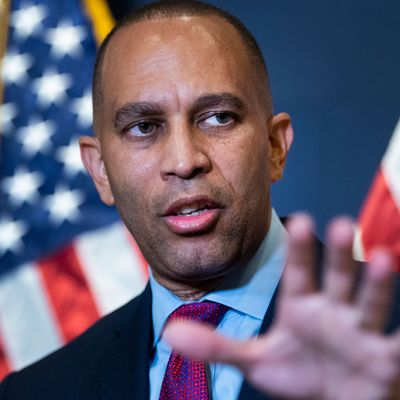
If you do so much as dip your toe into the swirling seas of Beltway political journalism, you probably know that one of the most cherished perennial topics is Democrats in Disarray. To be sure, internal struggles in either major party are catnip to the feline sensibilities of Washington insiders. But perhaps because Democrats are less rigidly ideological and are less prone to achieve discipline via a Maximum Leader like Donald Trump, their infighting seems especially enticing to scribblers.
The latest incident involves the formation of a new PAC to fight back lefty House primary insurgencies in safe Democratic districts, featuring three leaders of what is considered the centrist or Establishment wing of the party, as opposed to the progressive Squad whose expansion is feared, as the Washington Post reports:
Smoldering tensions between far-left activists and Washington’s Democratic House leaders are flaring again ahead of the midterm elections, prompting Rep. Hakeem Jeffries (D-N.Y.) and others to raise money to defend incumbents against primary challengers in congressional races …
Jeffries has formed a new fundraising effort, Team Blue PAC, with Problem Solvers Caucus co-chair Josh Gottheimer (D-N.J.) and New Democrat Coalition co-chair Terri A. Sewell (D-Ala.). The group will focus on protecting incumbent members of Congress in safe Democratic seats that are not a focus of the House Democratic campaign committee.
So to be clear, this is not about primary challenges in the competitive districts where victory by a Squad type might risk the loss of a precious seat to Republicans; the Democratic Congressional Campaign Committee deals with those kind of issues. So why is it necessary to fight challenges in safe Democratic territory?
Aside from simple collegial loyalty benefiting the targets of these challenges (notably, in 2022, Danny Davis of Illinois, Carolyn Maloney of New York, and Jim Cooper of Tennessee), the idea seems to be that a growing Squad (which already added two allies in 2020, New York’s Jamaal Bowman and Mondaire Jones) would be a threat to Democratic unity in the House, whether or not the Donkey Party hangs onto control of the chamber in the midterms. But there are other, less ideologically freighted explanations for Jeffries’s role in this fight: his leadership ambitions, as he is currently the fourth-ranking House Democrat at a time when the top three — Speaker Nancy Pelosi, Majority Leader Steny Hoyer, and Majority Whip Jim Clyburn — may be heading for the exit. There is also a parochial Gotham aspect to the struggle, since the Squad’s hotbed is in New York City, where its unquestioned leader, Alexandria Ocasio-Cortez, began a whole new era of left-bent Democratic politics with her stunning upset of leadership stalwart Joe Crowley in 2018.
Some progressives, of course, see a more sinister motive, as a Common Dreams piece last month reported. One ally of Justice Democrats, the group backing all three of the current wave of insurgents, referred to the Team Blue PAC as “a corporate-funded incumbent protection racket” that “should be called ‘Injustice Democrats.’” Fear of a Green New Deal by “corporate Democrats” seems to be the ascribed malign rationale for fighting putative new Squad members.
Who’s right and who’s wrong about this war of dollars and words? It’s hard to say. On the one hand, Jeffries & Co. have legitimate fears that members sworn to shake up the party and the Democratic caucus in pursuit of an ideological agenda might be troubling to the present and future leadership. On the other hand, the Squad has been loyal to the caucus in ways that make it entirely different from the ever-difficult House Freedom Caucus on the other side of the aisle. Threats and counterthreats aside, any demands the Squad has made of Pelosi in this especially fraught congressional session have yielded to party unity when the chips were down.
But there is also something unsavory about the progressive tendency to think that anything short of loud-and-proud democratic socialism in congressional nominees can only be explained by general-election fears or plain corruption. It is not obviously true that Democrats should put forward the most leftist candidate the general-election market can bear. Indeed, that plays right into Republican claims that all Democrats would be red-flag-waving Marxists if they could get away with it.
The best and perhaps only way to sort this out is for Democrats of every persuasion to defer to the wisdom of their own primary voters, without casting aspersions on the motives of any faction. If and when Hakeem Jeffries becomes House Democratic Leader, he may be justified in cracking the whip on dissidents. Until then, they — and he — are just Democrats.






























